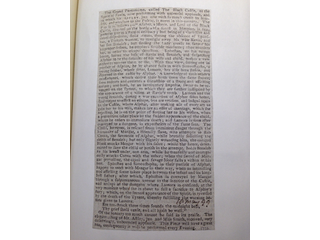Transcription
The Grand Pantomime, called The Black Castle, or the Spirit of Ravia, now performing with universal applause, and in which Mr. ASTLEY, jun acts with so much credit to himself, and pleasure to the Public, is novel in this country. The Plot is as follows:--“Aspher, a Moore, and Lord of the Black Castle, situated on the borders of a forest in Morocco, is supposed to live in a state of celibacy; but being of a vindictive and cruel disposition, finds means, during the absence of Ephestan, a Turkish warrior, to inveigle away his wife Ravia, and her song Benaleb; but finding the Lady averse to favour his improper desires, he employs forcible measures; then murders her, in order to escape detection. Ephestan, on his return home, learns the loss of Ravia and Benaleb, and suspecting Asphar to the detainer of his wife and child, makes a vow either to recover them or die. With this view, setting out in pursuit of Asphar, he by chance falls in with Simoustapha, a young soldier, whose sister, Lamora, has also been stolen, and detained in the castle by Asphar. A knowledge of each other’s misfortunes, which derive their birth from the same source, soon endears and cements a friendship of a strong and affecting nature; and both, by an involuntary impulse, swear to be revenged on the Tyrant, to which they are farther instigated by the appearance of a vision at Ravia’s tomb. Lamora and the young Benaleb, during a war excursion of Asphar from home, find means to effect an escape, but are retaken, and lodged again in the Castle, where Asphar, after making use of every art to gain her to his will, makes her an offer of marriage, which she rejecting, he is on the point of forcing her to his wishes, when a prevention takes place by the sudden appearance of the child, whom he orders to immediate death; and Lamora is soon after conveyed to a dungeon, in expectation of the same fate. The Child, however, is rescued from imminent danger through the humanity of Mangar, a friendly slave, who attempts to stab Cornu, the favourite of Asphar, while brutally soliciting the death of Benaleb; but only slightly wounding him, the enraged Black attacks Mangar with his sabre; while the latter, determined to save the child or perish in the attempt, holds Benaleb to his breast under one arm, while he manfully and courageously attacks Cornu with the other; when the sword of Mangar prevailing, the cruel and savage Moor falls a victim at his feet. Ephestan and Simoustapha, in their pursuit of Asphar, happen to meet with Mangar in their way, when an interesting and affecting scene takes place between the infant and its long-lost father; after which, Ephestan is conveyed by Mangar through a subterraneous avenue to the interior of the Castle, and arrives at the dungeon where Lamora is confined, at the very moment when she is about to fall a sacrifice to Asphar’s fury; which, on the second appearance of the Spirit, is reversed by the death of the Tyrant, thereby fulfilling the warning before given to Lamora.
Ere ten-struck three times founds the midnight bell,
Thy grief shall cease, and all again be well.”
Of the Scenery too much cannot be said in its praise. The elegant acting of Mr. Astley, jun and Miss Smith, received, very deservingly, unbounded applause. This Piece will have a great run, consequently it will be performed ever Evening.
